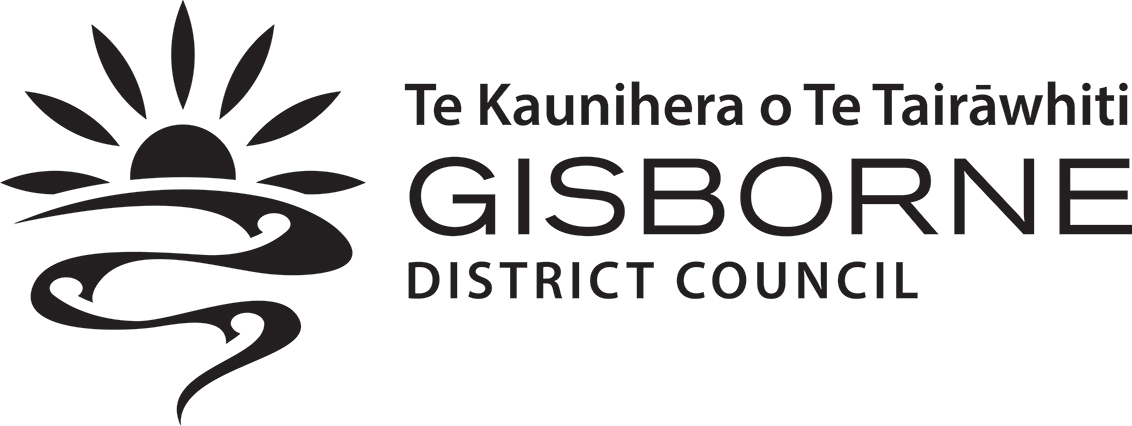Water alert levels apply to all users connected to Gisborne city's water supply.
Water restrictions are put in place when the water level in our dams are getting low or the water treatment plant can't make enough water to keep up with user demand.
Current water restriction
Sprinkler restrictions - level 2
- Sprinkler systems are only permitted between 6-8am
- Keep hand-held hosing to a minimum
- Conserve water at all times
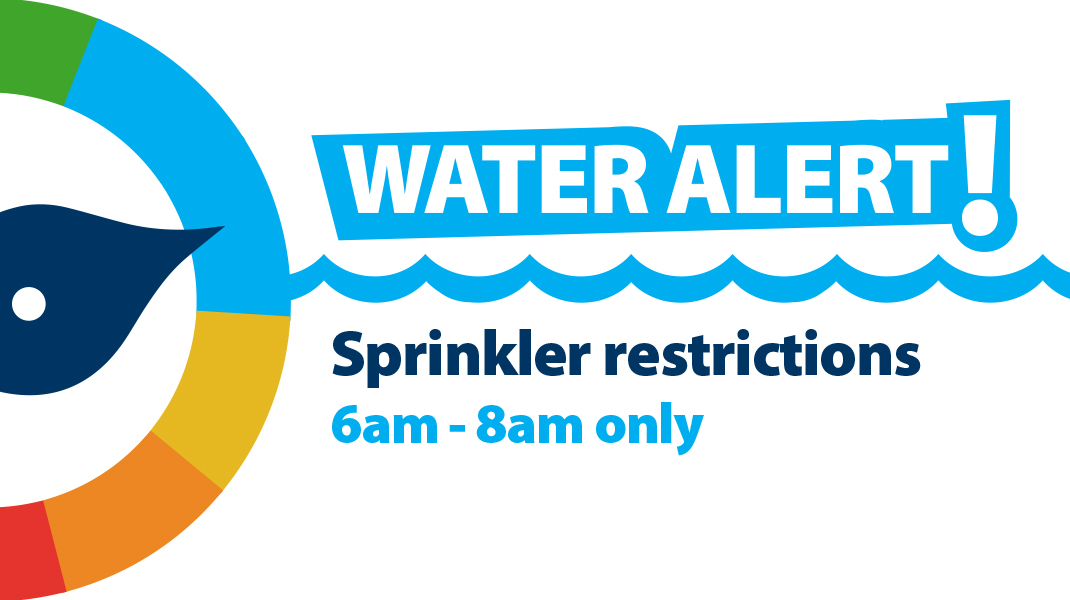
Water use during Level 2 and 3 restrictions Q&As
There's less water demand in the morning than at peak times during the day and early evening. Also people may forget to turn the sprinkler off at night.
Please conserve water by using a bucket to wash and only the hose to rinse off.
Wash your car on the grass, then it waters the lawn too.
Please conserve water - keep watering to a minimum, longer than 30 minutes is excessive. Avoid watering the garden during the heat of the day.
Please conserve water - keep it to a minimum. Also put a cover on the pool to stop the water evaporating.
Absolutely. Any automatic sprinkler system on parks, sport grounds and gardens (that don’t use bore water like the Botanical Gardens) are either changed to the time restriction or turned off.
We may water some gardens by hand with a mobile water sprayer. In some cases, there may be a need for essential watering for newly sown turf etc, but we'll keep watering to a minimum.
If rain's falling that means we see big decreases in water demand due to people not using water outside.
If the Mangapoike dam levels are low, we need a lot of rain in the Waingake catchment to top the dams up. Sometimes we don’t get enough rainfall in that area until the end of winter.
Water restrictions may remain in place during periods of rain in summer if we know there’s still a high demand coming up.
Gisborne has a secondary water treatment plant that draws water from the Waipaoa River.
It's essentially a 'back up' supply that's turned on when the dams reach a minimum limit.
The plant's prepared in time before it’s needed, but because river water needs more treatment than the Waingake supply, it’s more expensive to run.
Water used for irrigation by farmers, growers and even Council, doesn’t come from the city's drinking water supply.
These water users have permits to take a set amount of water from water sources such as streams, rivers or aquifers. In the Freshwater Plan there's rules that restrict water takes from these sources if the amount of water in them gets too low. These rules make sure that everyone who's taking water uses it responsibly and wisely.
Let your lawns go brown in summer. Gardens are ok to be watered, as long as you keep to the water alert level restrictions.
If you're concerned about water wastage or see a water leak, let us know so we can check it out.
Contact us anytime, use Antenno app or fill in our online request form.
Saving water tips
We encourage you to conserve water at all times, here's some easy water saving tips in and around your home.
In the laundry
- Fill the washing machine - always run full loads. This can save up to 125 litres per wash.
- Choose effective cycles - use the cycle with the least rinses, If you must wash small loads, select the lowest water level.
- Use the suds-saver - if your machine has this feature, reuse warm soapy water for the next load.
- Fix leaks - repair leaky taps, hoses or fittings - indoors and outdoors. This can save up to 32,000 litres per month.
In the bathroom
- Turn the tap off - while brushing your teeth or shaving. This can save up to 10 litres per minute.
- Take shorter showers - a 3 minute shower uses less than half the water of a bath - saving 80 litres per shower.
- Check your toilet for leaks - add a few drops of food colouring to the cistern. If it appears in the bowl without flushing, you've got a leak that needs fixing. Leaks can waste up to 32,000 litres per month.
- Fix leaking taps - even a small drip adds up quickly.
Renovating or building
- Install water-saving shower heads or a flow restrictor - save around 30 litres per shower.
- Upgrade your toilet - fit a flush saver device or dual flush system to save up to 10 litres per flush.
- Rinse and peel smart - use a bowl or half-filled sink instead of running water - saves 10 litres per minute.
- Dishwasher - wait until you have a full load and use the eco-setting - saves 125 litres for each wash.
- Waste disposal unit - only run when it's full - saves 10 litres per minute.
- Rinse dishes - fill the sink with water instead of running the tap - saves up to 20 litres.
- Cold drinking water - keep a jug in the fridge instead of running the tap until cold - saves up to 2 litres per glass.
- Cooking vegetables - use just enough water to cover them and a tight-fitting lid or better still, use the microwave.
- Water wise - only give plants what they need. Avoid over-watering or using inefficient irrigation systems.
- Check timers - if your irrigation system is on an automatic timer - switch it off.
- Time it right - don't water during the heat of the day.
- Plant smart - choose hardy, drought resistant varieties especially on steep slopes where there's a lot of runoff. Succulents, cacti and desert plants are easy care and provide interesting shapes and textures.
- Mulch or compost - cover flowerbeds with organic material to trap moisture, suppress weeds and enrich the soil.
- Mow high - keep lawns longer by using the highest mower setting. Longer grass grows deeper roots and holds more water.
- Reuse shower water - place a bucket in the shower to collect water and use if for pot plants.
- Sweep don't hose - clean paths and driveways with a broom instead of hosing them down.
- Cover pools - reduce evaporation by keeping pools covered when not in use.
- Bucket wash - use a bucket to wash your boats, bikes or cars - only use the hose for rinsing.
- Dual purpose washing - wash vehicles on the grass so you water your lawn at the same time.
Water restriction alert levels
Sprinkler restrictions - level 2
- Sprinkler systems are only permitted between 6-8am
- Keep hand-held hosing to a minimum
- Conserve water at all times

More advice and information
Frequently asked questions about water use during restrictions
- No sprinkler systems at all.
- Keep hand-held hosing to a minimum - but don't waste water.
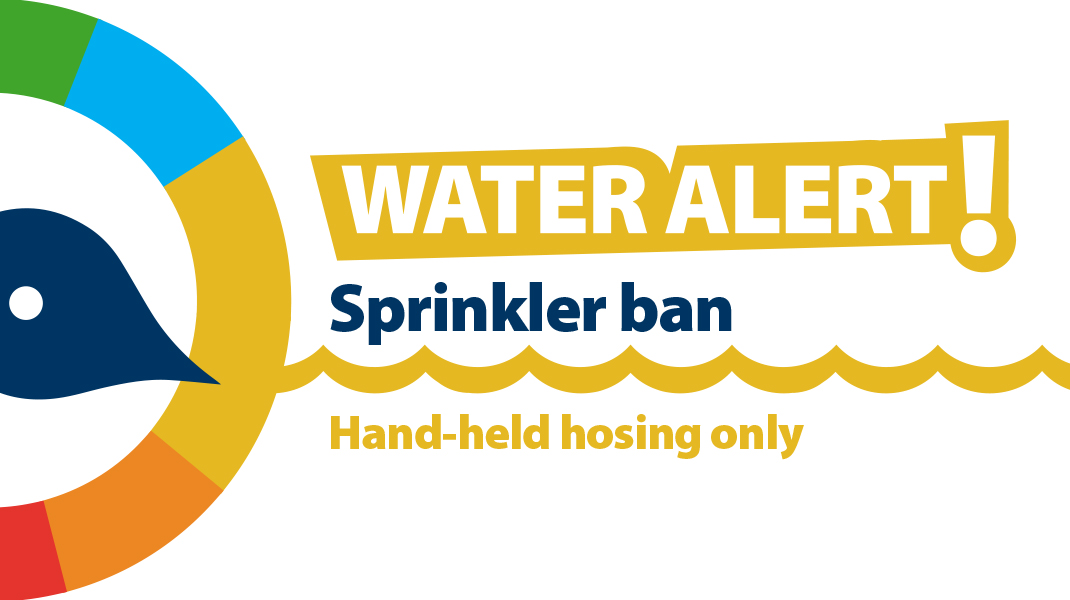
More advice and information
Frequently asked questions about water use during restrictions
- Outdoor water restrictions
- Residential - total outdoor water ban
- Industrial - essential outdoor water use only
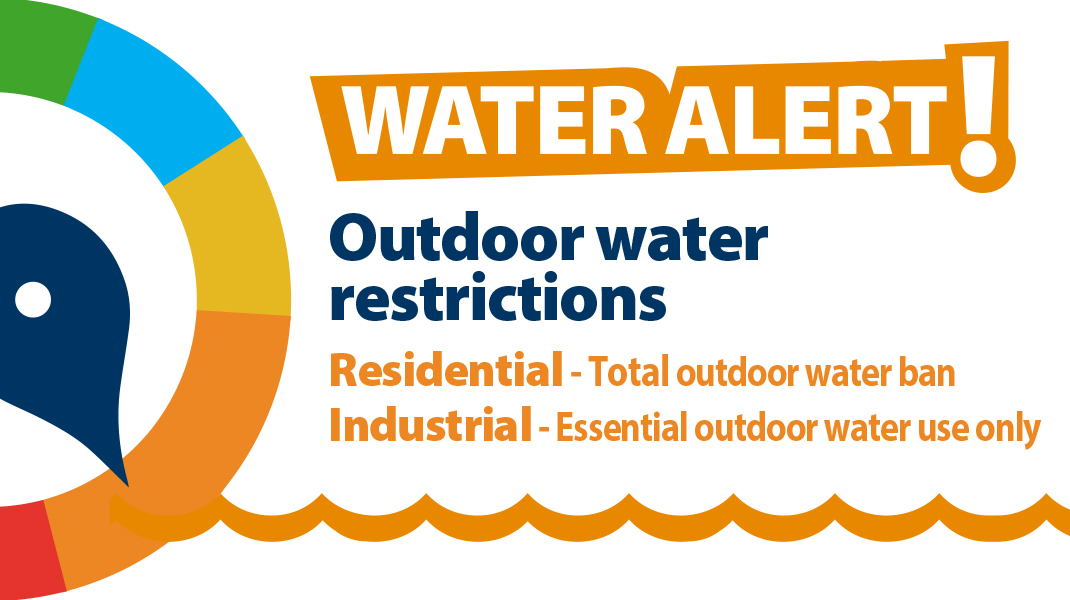
- Total outdoor water ban at all times
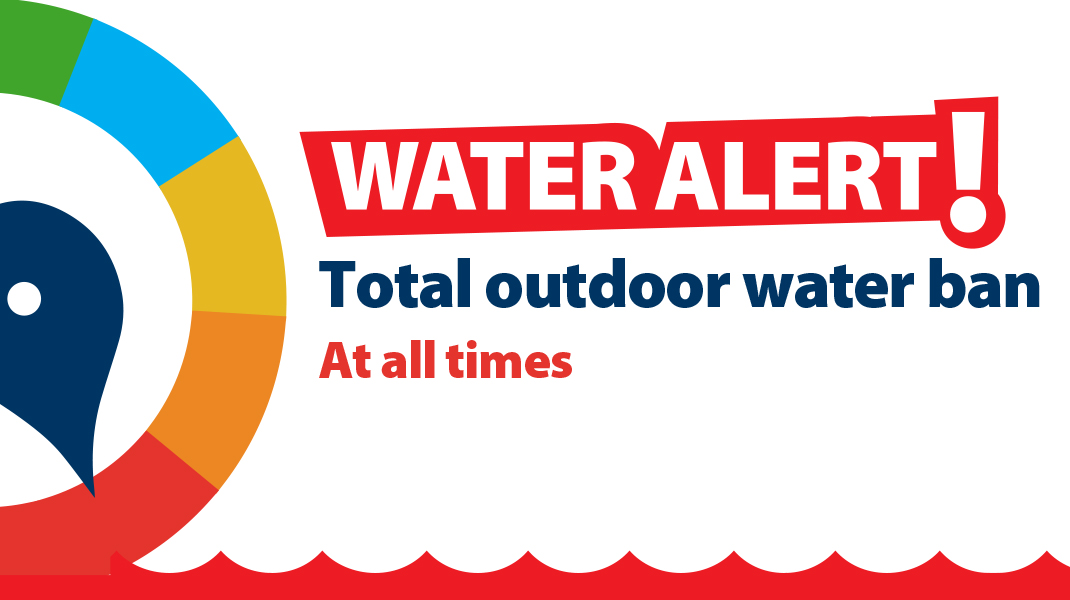
It's not on tap forever - conserve water at all times
We encourage you to reduce water use around the home. Small changes make a big difference - every drop counts.
Check out our easy water saving tips to lower demand and protect this precious resource.

